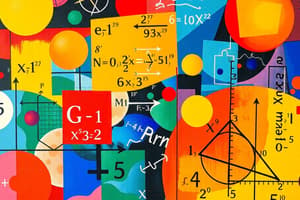Podcast
Questions and Answers
What does arithmetic primarily focus on?
What does arithmetic primarily focus on?
- Solving equations with variables
- Basic operations on numbers (correct)
- Studying shapes and sizes of objects
- Analyzing functions in abstract settings
Which branch of mathematics focuses on rates of change?
Which branch of mathematics focuses on rates of change?
- Geometry
- Algebra
- Calculus (correct)
- Number Theory
Which type of numbers includes both positive and negative values?
Which type of numbers includes both positive and negative values?
- Rational Numbers
- Natural Numbers
- Integers (correct)
- Irrational Numbers
In which branch would you study linear equations and polynomial functions?
In which branch would you study linear equations and polynomial functions?
What do geometric studies primarily concern?
What do geometric studies primarily concern?
Which of the following is an example of an irrational number?
Which of the following is an example of an irrational number?
In which mathematical field would limits and continuity be focused on?
In which mathematical field would limits and continuity be focused on?
Which of the following concepts is not directly studied in arithmetic?
Which of the following concepts is not directly studied in arithmetic?
Flashcards
Arithmetic
Arithmetic
Basic math operations on numbers (addition, subtraction, multiplication, division).
Algebra
Algebra
Using variables to represent unknowns, solving equations and inequalities.
Geometry
Geometry
Study of shapes, sizes, positions, and dimensions of objects.
Calculus
Calculus
Signup and view all the flashcards
Natural Numbers
Natural Numbers
Signup and view all the flashcards
Integers
Integers
Signup and view all the flashcards
Real Numbers
Real Numbers
Signup and view all the flashcards
Irrational Numbers
Irrational Numbers
Signup and view all the flashcards
Study Notes
Fundamental Concepts
- Mathematics is a broad field encompassing logic, numbers, quantities, structures, space, and change.
- It plays a crucial role in various scientific and technological disciplines.
- Core branches include arithmetic, algebra, geometry, calculus, and analysis.
Arithmetic
- Deals with basic operations on numbers (addition, subtraction, multiplication, division).
- Includes concepts like factors, multiples, primes, and divisibility rules.
- Covers fractions, decimals, and percentages.
- Studies properties of numbers and their relationships.
Algebra
- Extends arithmetic by using variables to represent unknown quantities.
- Involves solving equations and inequalities.
- Covers topics like linear equations, quadratic equations, systems of equations, and polynomials.
- Employs symbolic reasoning and manipulation.
- Studies patterns and relationships between variables.
- Focuses on abstract structures and operations.
Geometry
- Studies shapes, sizes, positions, angles, and dimensions of objects.
- Includes Euclidean geometry (plane and solid figures), coordinate geometry (relationship between shapes and coordinates), and non-Euclidean geometry.
- Concerns itself with lines, angles, triangles, circles, and three-dimensional figures.
- Addresses properties and relationships amongst geometric figures.
Calculus
- A branch of mathematics that deals with rates of change and accumulation.
- Involves concepts like derivatives (instantaneous rates of change) and integrals (accumulation of quantities).
- Provides tools for solving problems in physics, engineering, and other fields.
- Addresses problems related to motion, optimization, and area calculation.
- Crucial for modeling continuous change.
Analysis
- A field encompassing various mathematical concepts and methodologies.
- Includes real analysis, complex analysis, functional analysis, and topology.
- Focuses on limits, continuity, differentiation, and integration of functions.
- Studies various properties of functions in abstract settings.
Number Systems
- Natural numbers (1, 2, 3,...): Used for counting.
- Integers (..., -2, -1, 0, 1, 2,...): Include zero and negative numbers.
- Rational numbers: Numbers that can be expressed as a fraction p/q, where p and q are integers and q ≠ 0.
- Irrational numbers: Numbers that cannot be expressed as a fraction of two integers. Examples include pi (π) and the square root of 2 (√2).
- Real numbers: Combine rational and irrational numbers.
- Complex numbers: Extend real numbers to include the imaginary unit i, where i² = -1.
Sets and Logic
- Sets are collections of objects. Key operations include union, intersection, and difference.
- Logic provides a framework for reasoning and argumentation.
- Fundamental concepts in mathematical reasoning.
Mathematical Tools and Techniques
- Proofs: Used to establish mathematical statements and theorems.
- Mathematical models: Used to represent real-world phenomena.
- Problem-solving strategies: Used to approach and solve various mathematical problems.
- Estimation and approximation: Useful for getting a rough idea of quantity or outcome.
Studying That Suits You
Use AI to generate personalized quizzes and flashcards to suit your learning preferences.




